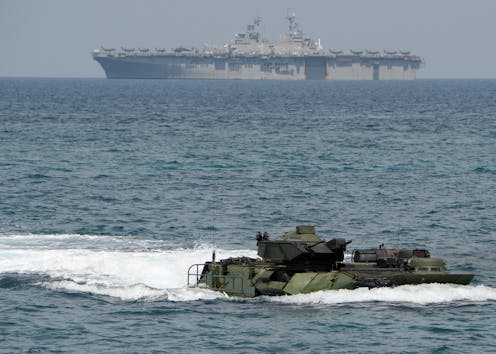The US is about to blow up a fake warship in the South China Sea – but naval rivalry with Beijing is very real and growing
- Written by Krista Wiegand, Professor of Political Science, University of Tennessee

As part of a joint military exercise with the Philippines, the U.S. Navy is slated to sink a mock warship[1] on April 26, 2023, in the South China Sea.
The live-fire drill is not a response to increased tensions[2] with China over Taiwan, both the U.S. and the Philippines have stressed. But, either way, Beijing isn’t happy – responding by holding its own staged military event[3] involving actual warships and fighter jets deployed around Taiwan, a self-governed island that Beijing claims as its own.
The tit-for-tat war games underscore a reality that U.S. presidents have increasingly had to contend with as the 21st century has drawn on. More than a century after President Theodore Roosevelt made the United States the preeminent maritime power[4] in the Pacific, that position is under threat[5]. China is seeking to displace it.
As a scholar of East Asian security and maritime disputes[6], I believe that the growing rivalry between the U.S. and China over dominance of the Pacific has the potential to define geopolitics in the Indo-Pacific region[7] for the next half-century.
Already, ongoing maritime disputes pit China against several Asian countries. For example, China regularly challenges the maritime rights[8] of Vietnam, the Philippines and Malaysia in the South China Sea and Japan in the East China Sea.
But the disputed waters are also of huge strategic importance to the U.S. It is where China is flexing its growing military might in the face of U.S. allies and partners, notably Taiwan, which the U.S. has committed to defend[9]. If a war between China and the U.S. is going to happen, I believe the South China Sea is likely to be a major theater, with Chinese aggression toward Taiwan the spark.
The scramble over the South China Sea
For centuries, the dozens of islands, shoals, reefs, banks and rocks in the South China Sea were regarded as little more than hazards to navigation.
But with the discovery of large reserves of oil and gas in the 1970s[10] and billions of dollars’ worth of fisheries[11], the previously largely ignored sea has gained significant attention from the countries whose shorelines meet it.
It led to a revival of elapsed conflicting claims of “ownership” over the sea.
China currently claims legal rights to the vast majority of the South China Sea, extending well beyond the boundaries established by the 1982 U.N. Convention on the Law of the Sea[12] (UNCLOS).
This claim by China, designated on maps by a nine-dash line[13], overlaps with the legally recognized maritime and territorial rights of the Philippines, Vietnam, Malaysia, Brunei and Indonesia.
References
- ^ sink a mock warship (apnews.com)
- ^ not a response to increased tensions (www.bbc.com)
- ^ holding its own staged military event (www.reuters.com)
- ^ made the United States the preeminent maritime power (www.usni.org)
- ^ position is under threat (www.cnn.com)
- ^ scholar of East Asian security and maritime disputes (bakercenter.utk.edu)
- ^ geopolitics in the Indo-Pacific region (www.whitehouse.gov)
- ^ challenges the maritime rights (www.cfr.org)
- ^ U.S. has committed to defend (www.reuters.com)
- ^ oil and gas in the 1970s (doi.org)
- ^ billions of dollars’ worth of fisheries (thediplomat.com)
- ^ Convention on the Law of the Sea (www.noaa.gov)
- ^ nine-dash line (time.com)
- ^ Omar Zaghloul/Anadolu Agency via Getty Images (www.gettyimages.com)
- ^ gray zone tactics (www.rand.org)
- ^ building military bases (www.theguardian.com)
- ^ claims were illegal (www.lawfareblog.com)
- ^ denied passage to U.S. Navy ships (www.lemonde.fr)
- ^ issued a U.S. position (2017-2021.state.gov)
- ^ in 2021 declared (www.state.gov)
- ^ US$3.4 trillion worth of products (chinapower.csis.org)
- ^ 14% of all U.S. maritime trade (chinapower.csis.org)
- ^ 30% of all global crude oil (www.eia.gov)
- ^ $11 billion worth of oil and 190 trillion cubic feet of proven deposits of natural gas (www.eia.gov)
- ^ half of all fishing vessels in the world (ocean.csis.org)
- ^ through the lens of its national security (www.lowyinstitute.org)
- ^ as acknowledged by the U.S. government (www.whitehouse.gov)
- ^ regular confrontations (www.independent.co.uk)
- ^ the national security interests of Washington (foreignpolicy.com)
- ^ engage in naval exercises (thediplomat.com)
- ^ taking place in April 2023 (apnews.com)
Authors: Krista Wiegand, Professor of Political Science, University of Tennessee

